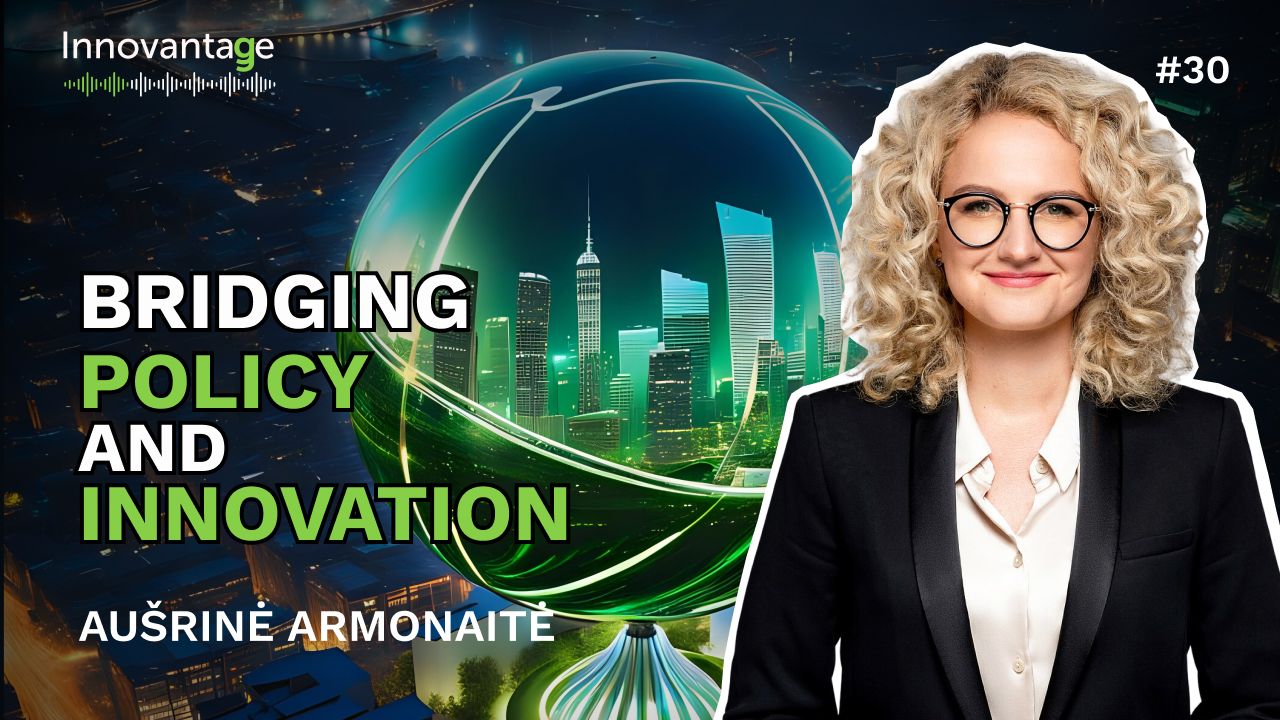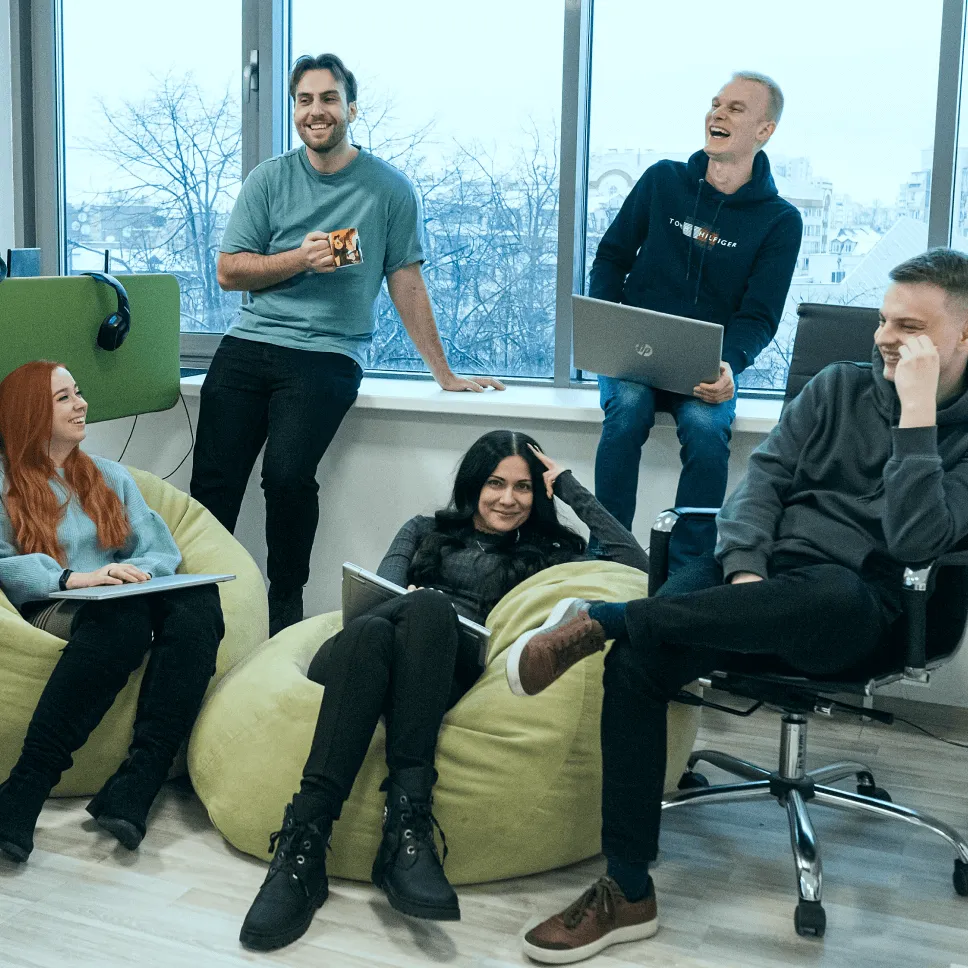

Fintech & Crowdfunding

September 9, 2025

10 min read

Innovation is one of the key topics typically covered in the Innovantage podcast. To explore this theme from multiple angles, its host and Sigli’s CBDO, Max Golikov, invites guests who bring diverse ideas and insights. While many conversations focus primarily on the business perspective, this episode takes a broader view.
This time, Max welcomed an expert who has a unique experience in the public and private sectors and can provide her vision from both angles. The podcast guest was Aušrinė Armonaitė, former Lithuanian Minister of Economy & Innovation.
Aušrinė entered politics at a very young age, as she had always been interested in public affairs and actively participated in youth organizations. In 2019, she founded the political party Laisvės partija (the Freedom Party).
She spent nearly a decade in politics. During this period, she served both as a Member of Parliament and later as Minister of Economy and Innovation until December 2024.
After leaving politics, Aušrinė began her journey in the private sector. Today, she is the Head of Investor Relations at InRento, a leading European prop-tech crowdfunding platform.
Though these two chapters of her career have clear differences, they also have some things in common. And that was also one of the topics discussed in this podcast episode.
InRento is a buy-to-let crowdfunding platform that was founded in 2020 amid the active development of Lithuania’s fintech sector. The company enables individuals to invest in real estate rental properties. What is very special here is that people don’t have to make big investments at once. They can start from as little as €500.
Disclaimer: Investing involves the risk of losing some or all of the amount invested, so it is recommended to diversify your investments and evaluate them responsibly.
InRento is rooted in Lithuania. But it is actively expanding its presence in Poland, Italy, and Ireland, and has plans to reach a broader European region.
The key idea behind it is making investing more accessible. Traditionally, people associate investing with deep financial knowledge and significant capital. InRento, alongside other crowdfunding models, lowers these barriers and brings investment opportunities closer to a wider audience. Aušrinė sees this as a game-changing shift in the investment world.
InRento works with partners who develop real estate rental projects. Quite often, these are conversions and renovations that give older buildings a new life. Numerous investors can participate in one project with their contributions, which are lent to project owners. Over 24 or 36 months, these projects typically generate an average return of nearly 12%.
Such returns may sound high, but they really reflect the dynamics of this market.
At the same time, Aušrinė emphasized that investing always involves risk. To mitigate it, investors should consider diversification across tools, geographies, and projects.
Max and Aušrinė also discussed the peculiarities of the society in Central and Eastern Europe and people’s attitude to investing.
The legacy of the Soviet system has greatly eroded community trust, which is a crucial element for business and investment.
However, today we can observe that this foundation is undergoing rapid change. Lithuania was once a small post-Soviet economy. Now, it has transformed into the European Union’s leading fintech hub. The country currently hosts 14–15 crowdfunding platforms. Meanwhile, many EU nations have none.
Speaking about her career, Aušrinė explained that politics offers a broad, global perspective. It touches on various areas, from biotechnology and lasers to fintech and entrepreneurship. By contrast, the private sector demands depth. It requires a focus on details and nuances within a single industry. And leaders must master every aspect to perform effectively.
During her time as Lithuania’s Minister of Economy and Innovation, Aušrinė and her team strengthened the country’s position as an advanced technology economy. This was achieved despite multiple overlapping crises, including the COVID-19 pandemic, war in Ukraine, and challenges linked to illegal migration. Under her leadership, Lithuania avoided recession, introduced innovation reforms, helped businesses enter new markets, and attracted record levels of foreign investment.
As a Member of Parliament for over eight years, she also championed human rights and worked to position Lithuania as an open, inclusive society. While some initiatives remain unfinished, others have become established policy.
When Max asked Aušrinė about the reasons for leaving politics, Aušrinė named both external and personal reasons. The weaker-than-expected election results for her political party signaled the need for change.
Though some politicians aim to remain in office at any cost, Aušrinė doesn’t share such views.
She preferred to start a new chapter. Moreover, she strongly believes that meaningful change for the country can be achieved in business as well, sometimes on an even larger scale. Lithuanian companies are already shaping not only the national economy but also Europe’s technological landscape.
Aušrinė highlighted the importance of change and renewal in both politics and business. Staying in the same position for too long can limit perspective and reduce creativity.
Experience in public service is highly valuable. But constant evolution is equally necessary. When it comes to politics, democracies risk stagnation when leaders don’t support changes. Democracies need not only experienced professionals, but also new people with fresh ideas.
Aušrinė explained that building trust with investors is central to her role at InRento. According to her, trust in the investment industry is earned through experience and a strong track record. InRento’s team, for example, has operated for over five years without any defaulted or late projects. That’s an excellent proof of careful and conservative management.
For Aušrinė, establishing her own credibility means building on this foundation from day one and ensuring that investors can rely on both her and the company.
In her opinion, trust extends beyond business. It is rooted in everyday interactions and relationships.
Though Eastern European background and historical distrust have shaped attitudes in the local society in Lithuania, social norms are gradually shifting toward openness and connection.
One of the factors that can also be used to demonstrate such shifts is the good level of English that people in Vilnius have. Today, it is much more than a communication tool. Good command of English also signals a global mindset and readiness to connect with the world.
For smaller countries, like Lithuania, being outward-looking is essential. The economy relies heavily on exports, and technology solutions developed locally must be applicable and competitive worldwide.
Speaking about the global arena and international cooperation, Aušrinė said that Eastern Europe can become a natural partner for Africa’s economic future.
In the African region, we can find many parallels with Central and Eastern Europe in the 1980s and 1990s.
Countries like Lithuania, Estonia, and the Czech Republic transformed from Soviet-planned economies into thriving technology hubs with rapidly growing purchasing power. It’s important to highlight that these achievements were made within a single generation. According to Aušrinė, this situation shows that similar economic leaps are possible elsewhere, including in Africa.
She emphasized the significance of respecting cultural differences and work styles. Many African nations are cautious as they are afraid of European “teaching” due to colonial histories.
However, Eastern Europeans have themselves experienced occupation and external control. Now, people in this region are open to connecting and do not support a top-down approach. Their historical perspective fosters empathy and understanding.
Meanwhile, Africa has a huge potential as a continent of opportunities, particularly for Europeans. Geographic proximity, aligned time zones, and growing digital and business hubs, such as Rwanda, make collaboration feasible and attractive.
While other global powers, like the US, are reducing their engagement in certain African regions, European countries have a good chance to step in and establish meaningful economic partnerships.
But what is behind the Lithuanian success? Aušrinė named four core pillars of Lithuania’s economic development that could offer lessons for African countries.
The private sector has a vital role in shaping education systems. Aušrinė mentioned such an initiative as Teachers Lead Tech. It was launched in Lithuania, and now, it is scaling internationally. Programs of this kind help teachers integrate technology into classrooms while supporting creativity and collaboration among students.
Aušrinė believes that education should not be left solely to policymakers. Broad participation helps cultivate critical thinking and independence in communities. All this is especially significant in today’s world, where diplomas are no longer enough. Practical experience and skills gained over time are becoming much more valuable than any formalities.
Max and Aušrinė also talked about modern hiring practices. Today, a lot of leaders pay much more attention to the personality and real experience of candidates than to their CVs. Nevertheless, understanding candidates requires time. Both the employer and applicant need to grasp the role and fit.
On the one hand, we can say that now personality matters more in hiring than it used to. On the other hand, AI is greatly disrupting the hiring process nowadays. Candidates can submit countless applications with AI-generated cover letters. At the same time, recruiters rely on AI to filter large volumes of submissions.
As a result, meaningful interactions between candidates and decision-makers are becoming difficult. And very often, it represents a barrier for talents looking for the right opportunities.
Aušrinė admitted that she is quite optimistic when it comes to evaluating progress and learning from mistakes. When she analyzes the results of her work, she always tries to find out whether her actions leave things better than they were found. Despite imperfections or occasional errors that may happen, making improvements is what matters most.
She believes that time and self-reflection are essential. Understanding one’s own approach to people, processes, and self-perception helps identify areas for growth.
Analyzing the outcomes, she also places achievements in perspective. For example, when she thinks about the results of her work in politics, she compares Lithuania’s progress to other regions, including Africa. Of course, setbacks occur, but according to Aušrinė, Lithuania’s story is a big success in the region.
In general, recognizing progress in daily operations is quite difficult. Lithuanians, culturally, tend to downplay achievements and focus on criticism.
Aušrinė mentioned a survey that named young Lithuanians among the happiest in the world. Such data sparked widespread debate and skepticism. Similarly, during an election campaign, she stated that Lithuania was experiencing its best economic period. This comment drew criticism even from her own team.
Nevertheless, acknowledging incremental progress shouldn’t be ignored. Comparing current outcomes to the starting point helps maintain perspective and even prevent discouragement.
In their discussion, Max and Aušrinė also spoke about the regulation. Aušrinė expressed caution regarding what is currently happening in the European regulatory environment. Recent proposals from the European Commission, including a pan-European tax on certain enterprises, can be potentially counterproductive.
Aušrinė believes that such measures are unlikely to be implemented. However, she stressed the need for policies that enhance competitiveness. Otherwise, their introduction can lead to the risk of undermining business growth.
According to Aušrinė, the European region needs forward-looking innovation, particularly in the context of AI and machine learning. While businesses have already embraced AI to automate processes and improve efficiency, its integration into education requires careful thought. Some people try to block AI from classrooms and universities. But it is not the best approach. Instead, AI can be used as a tool to enhance learning and better prepare students for a competitive world.
While someone may believe that ChatGPT can help students cheat, it’s vital not to forget that it can also become a private tutor available 24/7.
Apart from this, Aušrinė touched on the broader challenge of maintaining competitiveness in Europe. Staying in place requires running as fast as possible, while progress demands running even faster.
This principle is applicable to both politics and business. Careful decision-making to preserve economic growth is a must. Meanwhile, businesses are ready and willing to innovate to keep pace with global change. And this should be supported.
Want to learn more about technology and innovation in business? That’s what you will find in the next episodes of the Innovantage podcast. Don’t miss them!

